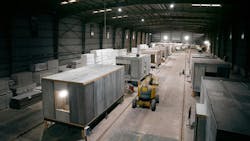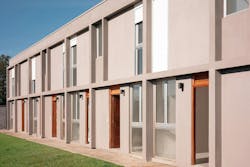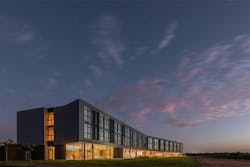'Trade Secret' Startup Builds Modular Homes out of Ceramic
A startup called Vantem constructs modular, factory-built homes that are energy efficient and affordable and can withstand extreme weather. Vantem achieves all that, explains founder and CEO Chris Anderson, by using an innovative panel for the floors, walls, and roofs. A type of ceramic, the panel looks and feels like cement but is much less carbon intensive.
Beyond that, Anderson says, the panel’s proprietary design is “a trade secret, like Coca-Cola.”
Compared to other panels that require additional reinforcements or protective layers, Vantem’s panels are fully structural, weather resistant, and fire retardant, Anderson adds. The panels don’t require drywall or cladding, and they can be painted.
Vantem’s technology “reduces the complexity of construction because it’s one panel that replaces all the structural members and the insulation,” Anderson says.
Vantem's Ceramic Structural Panels for Modular Homebuilding
Because of the product’s simplicity, one Vantem factory can produce up to 1 million square feet of living space each year. By the time a unit leaves the factory, it’s about 80% complete, with the rest of the work, such as pouring the foundations, performed onsite. On average, a Vantem-built structure is 20% less expensive than traditional construction and cuts down the total construction time by at least half.
“And the killer difference is the energy efficiency,” Anderson says. A Vantem home on average is 70% more energy efficient than a code-approved, stick-built home. “That translates to less operating cost for the family but also to a lower CO2 footprint,” he says. Over 50 years, a 2,200-sf home would produce 2,000 tons fewer CO2 emissions from heating and cooling than a traditionally built home.
More Than Homes
Vantem has been developing and testing its product for the past few years—building 3 million square feet of homes, schools, and other buildings in South America.
There have been other successful test cases. A Vantem home in the Bahamas withstood the islands’ strongest hurricane on record, the Category 5 Hurricane Dorian, in 2019. It was the only home in its neighborhood that didn’t get blown away or severely damaged, Anderson says. Vantem structures also have held up to Antarctic conditions and an 8.2 magnitude earthquake, as well as the world’s driest place, Chile’s Atacama Desert, where it hasn’t rained for centuries.
Last year, with investments led by the Bill Gates-founded Breakthrough Energy, Vantem began entering the U.S. market. Over the next 10 years, the company plans to roll out 20 U.S. factories—about half of them new greenfield factories, the other half acquisitions—that will produce affordable, energy-efficient homes in partnership with large developers.
In May, Vantem announced its acquisition of Affinity, a Georgia-based modular builder whose wood-framed, factory-built homes can withstand hurricane winds. Affinity’s process will be converted to use Vantem’s panels and produce net-zero homes that won’t require energy from the grid.
Vantem represents Anderson’s second business venture. His previous company converted sustainably harvested timber from South American rainforests into doors and windows, which were sold in big-box home improvement stores and used on job sites around the world.
“One thing struck us,” Anderson recalls. “We made doors and windows with 1/1,000 inch tolerance and then shipped them to job sites where the technology was at least 100 years old and the tolerances were inches off, not thousandths of an inch,” Anderson says. “That was the spark: There must be a better way to do this.”
Anderson, whose parents are from the U.S., grew up in Bolivia. “My business concepts were very much inspired by the early part of my life, growing up in the rainforests in Bolivia. That’s where you really saw the initial impacts of climate change,” he says.
“Human beings need shelter, but the way we build that shelter shouldn’t create a bigger problem down the road,” Anderson says.
RELATED:
- Sustainable, Structural Panels Made From Grass
- Styrofoam’s Promise for Hurricane-Proof Homes
- CertainTeed Launches Prefab Assembly for Residential Building


